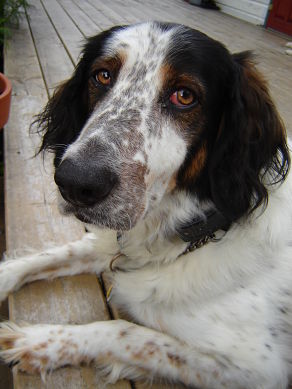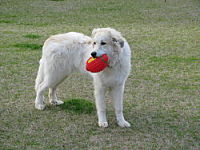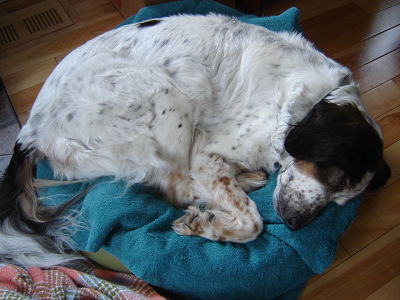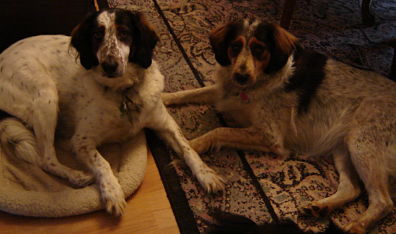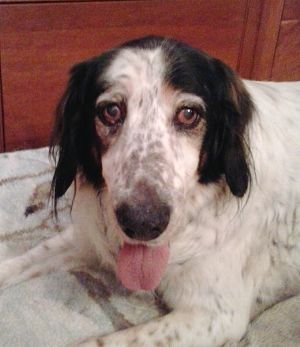Giardia in Dogs Is Caused By a Intestinal Parasite Protozoa
Giardia in dogs can be a very distressing experience for both dogs and human caregivers. Giardiasis is a parasitic intestinal infection caused by the Giardia Lamblia protozoa. It is a waterborne parasitic protozoa. It is not a worm.
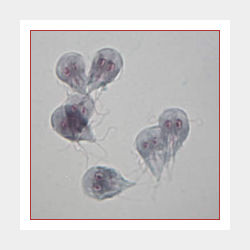
Protozoa are single celled organisms. The Giardia protozoa are commonly found in the intestines of animals, including dogs.
They are flagellates. Flagellates have hair like tendrils hanging down that act as legs to help them move and ' swim '. Those little things that look like eyes, are actually nuclei. The Giardia protozoa multiplies by dividing in two, thus the two nuclei. Clever parasites. Yes or yes?
Giardia can be very hard to detect in stool samples and even harder to get rid of.
Giardiasis Causes Diarrhea, Intestinal Damage and Distress
These microscopic parasites cling to the surface of the intestine. They can also float free in the watery, mucous lining of the intestine. These flagellate parasites cause inflammation in the intestine. Chronic inflammation will eventually cause damage to the intestinal wall that can result in severe distress and nutrient loss.
I would be a rich woman if I had a dollar for every person who has contacted me to say that their dog has recurring diarrhea. More often than not, this is related to a Giardia infection. Often Giardia in dogs goes undetected for a long time. When it is finally diagnosed, the infection is severe and damage has been done to the intestinal wall.
Next to skin problems, diarrhea in dogs is the most common complaint I get, and diarrhea is often caused by the Giardia Lamblia protozoa. There are several subspecies of Giardia but each one has a life cycle and a specific way of transmitting itself to another animal, in order to multiply.
Unfortunately, Giardia can be passed on from one dog to another, and humans can be infected by Giardia, too. So make sure you wash your hands. Giardia is easily spread from dog to dog and is often a problem in households with multiple dogs. Giardia is common in puppies born to mothers who have this annoying parasite protozoa.
Why Do Dogs Get Giardia Lamblia?
If a dog comes in contact with Giardia and does not have a strong immune system, it will be unable to resist the infection. The severity of the infection depends on the overall health of the dog. Healthy dogs are more able to naturally control the presence of the Giardia parasite in the intestinal environment.
In North America, infection of Giardia in dogs is reported to be about 8%. The rate of infection in puppies is much higher at about 36% to 50%. Dogs in shelters and kennels are very much more at risk. Giardia in dogs in confined enclosed environments can be as high as 100%.
How Do Dogs Get Giardia?
Your dog becomes infected by ingesting ( eating or drinking ) the Giardia cysts. The most common ways dogs ingest the Giardia cysts are:
- eating the poop
of another infected animal, or ingesting some other thing that has been
contaminated with feces that contain the Giardia cysts, such as eating contaminated grass
or sticks, or anything else your dog might put in his mouth.
- drinking contaminated outdoor water from ponds, birdbaths, puddles etc. If you have a well, get it tested.
Once your dog has
ingested the cysts, they now have the opportunity to travel through the digestive system and break
open in the intestines. There, the Giardia feed and multiply.
Giardia in Dogs Has Two Stages of Development
- a feeding stage that lives, feeds and moves, and multiplies within the intestinal environment.
- a cyst stage that leaves the body by shedding into the feces when your dog poops. This is the stage when a dog is able to potentially spread the Giardia parasite to another dog.
Does Your Dog Have These Giardia Symptoms ?
- intermittent, recurring diarrhea, mild to severe, frequent or infrequent.
- explosive diarrhea
- soft, light greenish colored, greasy looking stools
- excessive intestinal gas
- weight loss
- loss of appetite
- eating normally but still losing weight.
- dehydration
- listlessness and fatigue
- mucous in the stool
- bloody stool
- nausea and vomiting
- excessive grass eating
Some experts see excessive grass eating as a symptom, because eating grass will often make a dog purge, either by vomiting or by prompting stool elimination.
Some experts point to stool eating ( copraphagia ) as a symptom of Giardiasis in dogs because the infected dog will attempt to regain nutrients and bacteria lost through diarrhea.
Diagnosing Giardia in Dogs
- Take your dog to the vet.
- Cysts must be found in the fecal sample, or the vet can test the stool sample for Giardia specific antigens ( cell proteins )
- Three ( 3 ) stool samples should be taken over a period of ten days to two weeks. The reason for this, is that the cysts are passed periodically, not with every bowel movement.
Just because you receive a negative result,
does not rule out that your dog may have Giardiasis.
Trust me, I know about this! You can read about my dog Jack, below.
Jack's Giardia Story...
My dog Jack, who actually had Giardia for the first seven years of his life, would show symptoms on and off, but my vet was never able to pinpoint this problem.
Jack had a problem with intermittent bouts of diarrhea as a puppy, and the problem continued into adult dog-hood. Jack couldn't gain weight. About every three weeks or so, he would have loose, smelly, mucousy stools, sometimes with bloody diarrhea, urgent bowel movements and occasional vomiting. This went on for years.
You can imagine how much I worried about him, but no positive results for Giardia were found until many years later. Finally, Giardia was diagnosed, but Jack did not respond to conventional treatment.
Conventional Giardia Treatment for Dogs
The most commonly used drug is Metronidazole ( Flagyl ) which is an antibiotic/anti protozoal drug. This drug can be used alone, or in combination with other drugs such as Panacur.
Often the drugs used to treat Giardia in dogs are not 100% effective and have the potential to upset the gut microbiome and even cause liver damage, as well as other dangerous and unpleasant side effects.
Since conventional medications have so many side effects, and are not really as effective as they should be for this problem of Giardia in dogs, natural remedies are a good alternative to conventional Giardia treatment, but they will take longer to work.
You can also use natural remedies for Giardia in conjunction with conventional meds. Natural remedies for Giardia help the drugs work better, won't interfere with conventional treatment, while at the same time supporting the dog's natural liver detox abilities so there will be less drug side effects.
I suggest a gentle parasite cleanse for dogs once or twice a year, whether your dog has Giardia, or not.
Giardia in dogs can be a very distressing problem for both dogs and human caregivers. Having been through this dog health problem, I know how hard it is. You can enter your email above, to learn more about my natural remedy suggestions for Giardia, and get help for this confusing difficult parasite.
Return to Common Dog Health Problems
New! Comments
Have your say about what you've just read here. Use the comments box below.
Sharing is appreciated!
